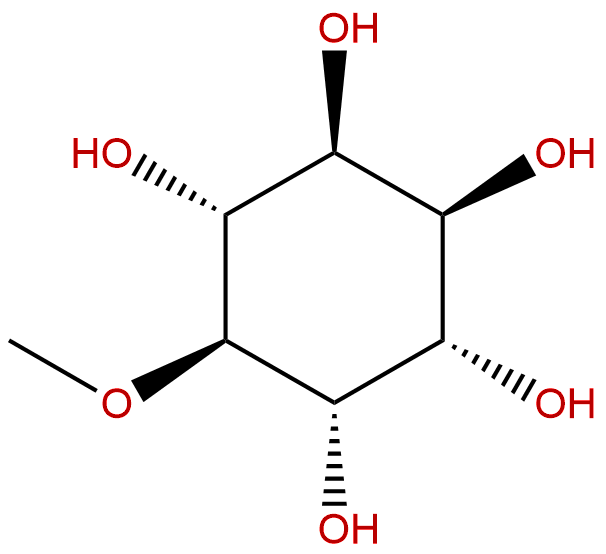
D-PinitolCAS No.:10284-63-6
|
||||||||||
 |
|
|
||||||||

| Catalogue No.: | BP0515 |
| Formula: | C7H14O6 |
| Mol Weight: | 194.183 |
Product name: D-Pinitol
Synonym name: 3-O-Methyl-D-chiro-inositol; Matezitol; Sennitol; Cathartomannitol
Catalogue No.: BP0515
Cas No.: 10284-63-6
Formula: C7H14O6
Mol Weight: 194.183
Botanical Source: Widely distributed in plants. Produced on a large scale from the heartwood of Pinus lambertiana
Physical Description: Powder
Type of Compound: Miscellaneous
Purity: 95%~99%
Analysis Method: HPLC-DAD or/and HPLC-ELSD
Identification Method: Mass, NMR
Packing: Brown vial or HDPE plastic bottle
Storage: Store in a well closed container, protected from air and light. Put into refrigerate or freeze for long term storage.
Whenever possible, you should prepare and use solutions on the same day. However, if you need to make up stock solutions in advance, we recommend that you store the solution as aliquots in tightly sealed vials at -20℃. Generally, these will be useable for up to two weeks.
The product could be supplied from milligrams to grams, up to kilograms
Inquire for bulk scale.
Descriptions:
D-Pinitol is azole nucleoside analogue, as potential antitumor agents; it reduces the migration and the invasion of prostate cancer cells (PC3 and DU145) at noncytotoxic concentrations, reduces mRNA and cell surface expression of αvβ3 integrin, exerts its inhibitory effects by reducing focal adhesion kinase (FAK) phosphorylation, c-Src kinase activity and NF-kB activation; thus, D-pinitol may be a novel anti-metastasis agent for the treatment of prostate cancer metastasis.[1,2]
D-Pinitol has hepatoprotective effects by attenuating hyperglycaemia-mediated pro-inflammatory cytokines and oxidative stress.[3]
D-Pinitol and myo-inositol stimulate translocation of glucose transporter 4 in skeletal muscle of C57BL/6 mice, they have the potential to prevent diabetes mellitus by reducing the postprandial blood glucose level and stimulating GLUT4 translocation in the skeletal muscle.[4]
D-Pinitol significantly inhibits the proliferation of MCF-7 cells in a concentration-dependent manner, while upregulating the expression of p53, Bax and down regulating Bcl-2 and NF-kB, thus, D-pinitol induces apotosis in MCF-7 cells through regulation of proteins of pro- and anti-apoptotic cascades.[5]
D-Pinitol efficiently attenuates the hazardous consequences of the environmental carcinogen 7,12-DMBA through modulating cell surface glycoproteins, membrane protective role both in lysosomal and ATPase compartment via its antioxidant nature which ultimately results in the findings of future innovative remedies for genotoxin mediated hazards.[6]
References:
[1] Tianrong Z, Hongxiang L. Carbohyd Res, 2007, 342(6):865-9.
[2] Lin T H, Tan T W, Tsai T H, et al. Int J Mol Sci, 2013, 14(5):9790-802.
[3] Sivakumar S, Palsamy P, Subramanian S P. Free Radical Res, 2010, 44(6):668-78.
[4] Dang N T, Mukai R, Yoshida K, et al. Biosci Biotech Biochem, 2010, 74(5):1062-7.
[5] Rengarajan T, Nandakumar N, Rajendran P, et al. Asian Pac J Cancer P, 2014, 15(4):1757-62.
[6] Rengarajan T, Nandakumar N, Balasubramanian M P. J Exp Ther Oncol, 2012, 10(1):39-49.
[7] Ling C, Jian H, Yang L V, et al. Chinese Journal of Experimental Traditional Medical Formulae, 2011, 17(5):80-2.
HPLC of D-Pinitol
